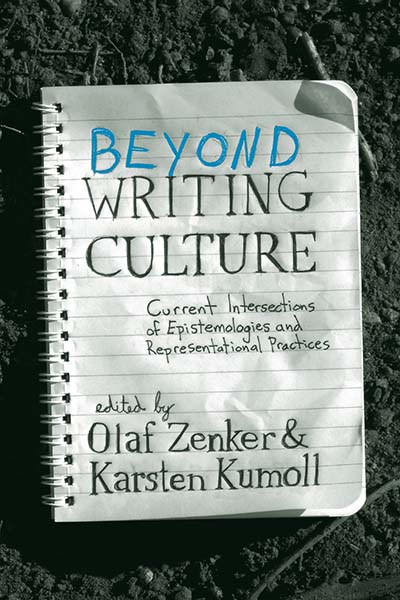In 1986, Writing Culture: The Poetics and Politics of Ethnography was published, and it changed the perception of ethnographic study from then on. Little more than 20 years later, Olaf Zenker and Karsten Kumoll took its reach further with Beyond Writing Culture: Current Intersections of Epistemologies and Representational Practices, published originally in 2010 and published as a paperback last month. Below, the editors share how their work engages with the inspiration piece, how they came to publish the collection, and the ways in which their work corresponds to and challenges the original.
_____________________________
Berghahn Books: Tell us about the original Writing Culture? How does your volume expound on the principles set forth in this groundbreaking work, and how does your volume differ?

Olaf Zenker: The publication in 1986 of Writing Culture by James Clifford and George Marcus was crucial for the discipline of anthropology as a whole.
The book highlighted the predicaments of ethnographic representation and became the key reference for broader controversies about adequate forms of ethnographic writing, reflexivity, objectivity, postmodernism, the culture-concept as well as ethnographic authority in an increasingly fragmented, globalized and postcolonial world. As such it left a lasting mark on theorising in anthropology and the social sciences in general.
Karsten Kumoll: However, although Writing Culture gave rise to such multifaceted debates, the text itself primarily dealt with the poetics of ethnography, largely sidelining political and epistemological matters. This is where our volume moves ‘Beyond Writing Culture’: all contributions situate the so-called ‘crisis of representation’ in a world beyond texts and deal with diverse facets of the complicated interrelations between epistemology and representational practices. Our book thus builds on Writing Culture, but simultaneously moves forward through discussing its weaknesses and suggesting ways to deal with them more productively.
BB: Do you think there are aspects of this work that will be controversial to other scholars working in the field?
KK: We brought together a quite diverse set of thinkers from anthropology, sociology, cognitive science and history. Their approaches to different aspects of the Writing Culture debate thus constitute a whole spectrum of positions, which are not necessarily in agreement with each other. We consciously fostered such a variety in disciplines and perspectives in order to exemplify, and contribute to, the multitude of current debates on Writing Culture’s many loose ends.
OZ: Readers with all kinds of academic backgrounds and theoretical perspectives are thus likely to find both arguments they can immediately relate to and discussions that might be challenging their present attitudes towards epistemologies and representational practices within the social sciences. In other words, some chapters will surely be controversial – yet which ones these are will also depend on the vantage points of the readers themselves. The book thus offers food for thought for quite diverse audiences.
BB: What is one lesson scholars can take from your volume?
KK: For many years Olaf and I have been in dialogue about epistemologies, theories of representation and the actual practices of social sciences. Writing Culture has naturally constituted a key reference point in such discussions. However, we have felt for a long time that the polarized debates around Writing Culture, frequently oscillating between emphatic celebration and polemical condemnation, have been rather unproductive and not done justice to the underlying theoretical issues. That’s why we decided to organize a conference in 2006 on the twentieth anniversary of Writing Culture’s first publication, attempting to deal with the core issues in a profound, but more modest way. “Beyond Writing Culture” is the outcome of this endeavour.
OZ: That’s right. Celebratory attempts at canonizing Writing Culture as a long overdue postmodernist critique of anthropology often turned a blind eye to evident problems embedded in this landmark text. By contrast demonizing dismissals, portraying Writing Culture as threatening the existence of the professional discipline, frequently failed to really take seriously the epistemological and political challenge as to how to know as well as speak about (and for) the other. If our book has one single lesson it is the foundational acknowledgement that these challenges have to be, and arguably can be, addressed – preferably in what we call “recursive” ways, since theorising about intersections of epistemology and representational practice inevitably entails already realising such intersections.
________________________________________
Olaf Zenker is Ambizione Research Fellow (SNSF) at the Institute of Social Anthropology at the University of Bern, Switzerland. He received his PhD from the Martin Luther University and the Max Planck Institute for Social Anthropology, Halle/Saale, Germany, and was also a postdoctoral researcher in the Max Planck Fellow Group Law, Organization, Science, & Technology. His publications include the book Irish/ness Is All Around Us: Language Revivalism and the Culture of Ethnic Identity in Northern Ireland (Berghahn Books, 2013).
Karsten Kumoll is Programme Manager at the German Council of Science and Humanities (Wissenschaftsrat), advising the Federal and State (Länder) governments on the system of higher education and research. He obtained his Ph.D. in sociology from the University of Freiburg. Its subject was Marshall Sahlins’ complete works and it was subsequently published as: Kultur, Geschichte und die Indigenisierung der Moderne: Eine Analyse des Gesamtwerks von Marshall Sahlins (Bielefeld, 2007).
